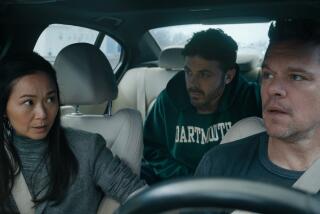Review: With a trio of Oscar winners, ‘The Little Things’ is a moody throwback to ’90s thrillers
Long before Denzel Washington opens his mouth to explain, the meaning of the title “The Little Things” is clear enough: Pay close attention, because details matter. I should admit that I missed a few at the very beginning. This fastidiously grim psychological thriller opens on a dark stretch of California highway, illuminated only by a young woman’s headlights — and then by the lights of the car that speeds up behind her, then roars ahead before coming to a sudden, disquieting stop. So swiftly does the writer-director John Lee Hancock create a sense of menace that the significance of some of those little things — the B-52’s “Roam” blaring from the car radio, the conspicuous absence of a cellphone — might elude you, too, until after you’ve finally exhaled.
Simply put, “The Little Things” is set in the 1990s — a fact driven home by images of an older, less gentrified Los Angeles, and also by the recurring sight of cops using pay phones. Less apparent, though it makes sense in retrospect, is the fact that Hancock actually wrote the script in the 1990s — in 1993, to be exact, sandwiched between the releases of “The Silence of the Lambs” (1991) and “Seven” (1995), the two crowning achievements of a renaissance decade for serial-killer cinema. It’s interesting to think what might have become of “The Little Things” if it had been produced back then, and to wonder if it might have joined their grisly but rarefied company.
Twenty-eight years later, we have at least some semblance of an answer — a respectable “probably not.” Of course, the version before us, which is being released in a few theaters and on HBO Max, is merely an approximation of what might have been. Once floated as a project for Steven Spielberg or Clint Eastwood (who in 1993 had just filmed Hancock’s script for “A Perfect World”), the movie has now been directed by Hancock himself, who brings his sturdy, unfussy craftsmanship to bear on his own material. (His capable collaborators include the cinematographer John Schwartzman, shooting on digital, and the production designer Michael Corenblith.) And he’s had the good sense to cast Washington, incidentally one of a handful of movie stars who remain as popular now as they were in the ’90s.
Washington plays Joe “Deke” Deacon, who spent many years as a Los Angeles homicide detective, until a failed serial-murder investigation drove him nearly mad and led him to retreat north to Kern County, where he now works as a sheriff’s deputy. But a random trip to L.A. reawakens Deke’s memories of those still-unsolved crimes (glimpsed here in quick, jolting flashbacks), even as it puts him back in contact with his old friends and nemeses on the force. He also meets Jim Baxter (Rami Malek), a young hotshot who’s being hailed as his spiritual successor. In traditional buddy-cop-movie fashion, Baxter and Deke initially rub each other the wrong way before settling into a comfortable groove: They’re two equally dogged investigators, brought together by a case as grisly and puzzling as the one that ended Deke’s career.
The serial killer this time, much like the serial killer last time, is targeting young women, which is both a depressingly accurate representation of real-world psychopathy and a reminder of how generic the conventions of crime fiction have inevitably become. The images that emerge from the case are the stuff of a hundred cable procedurals: a blood-spattered crime scene, nude bodies on autopsy tables, a wall of evidence that Deke pores over obsessively in his grungy motel room. The dialogue, too, often feels recycled wholesale from countless cop shows and movies, apparent in Deke and Baxter’s creaky, overly studied banter (which sometimes hinders rather than helps the actors’ otherwise engrossing rapport) as well as their furrowed-brow speculations about what kind of sicko they’re pursuing.
A candidate soon presents himself in the gratuitously unpleasant form of Albert Sparma, a stringy-haired repairman played with maximum calculated creepiness by Jared Leto, who rounds out this movie’s trio of Oscar winners, fittingly, by wearing a prosthetic nose. A lover of flamboyant villainy and Method-tic weirdness, as evidenced by his manic, miserable recent incarnation as the Joker, Leto is actually pretty restrained here by comparison: Speaking in soft, halting jeers, his Sparma is like a rat who’s never happier than when he’s cornered. Whether he’s being pursued up and down the freeway or hauled in for questioning, he taunts his interrogators mercilessly and seems almost aroused by their interest in him as a potential suspect.
Is he indeed the murderer they seek, or just a hygienically challenged true-crime buff who happened to live and work in close proximity to many of the victims? That’s the question that increasingly eats away at Baxter, who, again in tried-and-true movie fashion, finds himself following uncomfortably in Deke’s own troubled footsteps. His life at home with his wife and children suffers. Bungled identifications and missing evidence tear at his sense of justice, his belief that the truth will always prevail. The reality of this and other investigations — that cases do go cold, and that the innocent he’s sworn to protect and serve do often die in vain — comes as a frustrating and ultimately brutal shock.
More for him, perhaps, than for the audience. “The Little Things” has a couple of hair-raising scenes and a few nifty, low-key twists in store, though little about the overall experience of watching it can really be called surprising. I don’t mean that as a knock. The pleasures and comforts of crime fiction, even with the built-in expectations of suspense and revelation, are not always dependent on novelty. And while Hancock’s movie may look at first like a hollow retread, I’d describe it as more of an unhollow retread, a movie in which even the hoariest-looking conventions have an undertow of real feeling. It induces the strange sensation of encountering clichés before they were clichés, of opening an unusually well-preserved time capsule or taking a trip down a corpse-strewn memory lane.
While the movie’s generic kinship with the much-grislier “Seven” is obvious, it also seems to echo — or anticipate, depending on how you look at it — the lingering chill of a superior David Fincher serial-killer thriller, “Zodiac” (2007). In that magnificent cold-case classic, the spiritual and psychological toll of a decades-long murder investigation, done in pursuit of a truth that can never be established or proved, became the movie’s all-consuming subject. Although nowhere near as credible or ambitious, “The Little Things” attempts a gentler version of this pessimism. It suggests, in Washington’s cynical smile and Malek’s haunted stare, what happens when a professional duty becomes an all-consuming personal obsession, when the quest for justice reaches an epistemological dead end.
It’s the very opposite of reassurance, and yet Hancock, for better or worse, gives it a patina of comfort, a glow of old-school Hollywood satisfaction. Best known for directing prestige pablum like “The Blind Side” and “Saving Mr. Banks,” he may seem an odd fit for this kind of blood-slicked pulp fiction, his work on last year’s “The Highwaymen” notwithstanding. But Hancock has a gift for mounting suspense, a tactful way with screen violence and a keener feel than most for the geography of Los Angeles, all of which he uses to his advantage here. He hasn’t exactly reanimated an overworked genre, but from time to time he locates an unexpectedly steady pulse.
‘The Little Things’
Rating: R, for violent/disturbing images, language and full nudity
Running time: 2 hours, 8 minutes
Playing: Starts Jan. 29, Paramount Drive-In Theatres, Paramount; Mission Tiki Drive-In Theatre, Montclair; and Van Buren Drive-In Theatre, Riverside; also on HBO Max
More to Read
Only good movies
Get the Indie Focus newsletter, Mark Olsen's weekly guide to the world of cinema.
You may occasionally receive promotional content from the Los Angeles Times.











